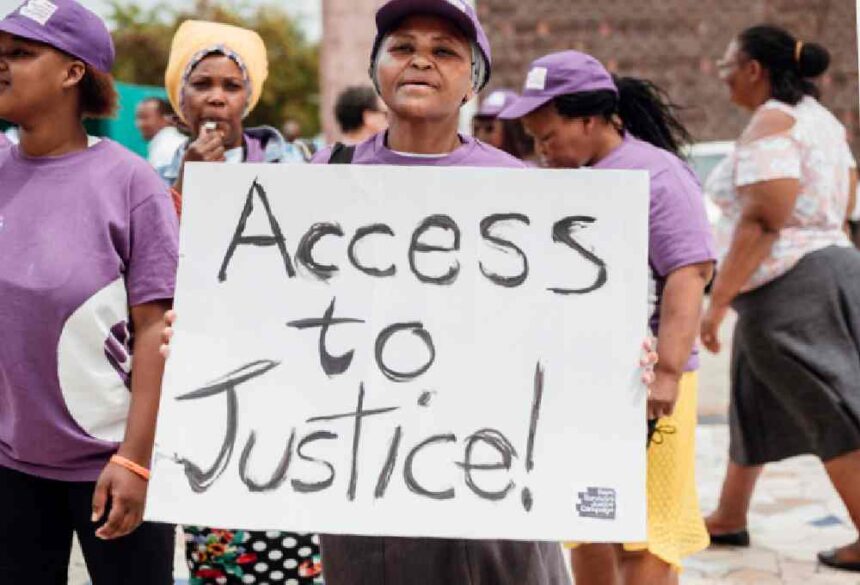Sexual violence remains a critical issue in South Africa, with the recent arrest of 222 suspects for rape in just the first week of April 2025. However, research indicates that many of these cases may not result in convictions, highlighting the issue of rape case attrition in the country.
Rape case attrition refers to the gradual dropping of cases before reaching a conviction. It examines the disparity between the number of reported rape cases and those that actually proceed to trial and lead to a conviction. This phenomenon is closely linked to how survivors are perceived and treated by law enforcement, prosecutors, and judges throughout the justice process. Survivors often face pressure to maintain consistency, respectability, and composure, even in the aftermath of trauma.
While South Africa boasts strong laws on paper, such as the Sexual Offences Act and a progressive constitution that guarantees dignity and equality, these protections often falter in practice. The Integrated Victim Empowerment Programme, designed to ensure dignified treatment of survivors, frequently falls short as many survivors report experiencing secondary victimization at the hands of law enforcement.
Several factors contribute to the high rate of rape case attrition in South Africa. Insufficient training within the criminal justice system leads to a low success rate in prosecuting rape cases. Many individuals lack adequate knowledge of the dynamics of sexual violence and the impact of trauma on survivor testimony. Survivors often endure hostile cross-examinations and lengthy delays, making seeking justice a daunting and punishing experience.
Furthermore, prosecutors often base their decisions on subjective assessments of a survivor’s credibility, leading to cases being dismissed based on stereotypes or biases. Police discretion also plays a significant role in shaping the trajectory of a case, with many officers holding onto societal attitudes that undermine survivor credibility.
Forensic capacity issues, including a DNA backlog exceeding 140,000 cases, contribute to case backlogs and delays in the justice system. Investing in forensic resources, enhancing training for forensic units, and increasing judicial capacity, particularly in sexual offences courts, can help expedite evidence collection and processing.
To improve the justice process for survivors of rape in South Africa, structural, ideological, and institutional changes are necessary. Mandatory anti-bias, racism, and sexism training for all justice system personnel is crucial, along with implementing accountability measures for officials who mishandle cases or exhibit bias. The focus should shift towards perpetrator accountability, rather than survivors having to prove their innocence. Investment in survivor support services is essential to ensure that all survivors, regardless of background, have access to comprehensive support.
In conclusion, addressing the gaps in the South African justice system and implementing reforms to support survivors of sexual violence is imperative to achieving justice and combating rape case attrition in the country. The world of technology is constantly evolving, with new innovations and advancements being made every day. One of the most exciting and revolutionary developments in recent years has been the rise of artificial intelligence (AI). AI has the potential to completely transform the way we live, work, and interact with the world around us.
One of the key areas where AI is making a significant impact is in the field of healthcare. From diagnosing diseases to developing new treatments, AI is revolutionizing the way we approach healthcare and improving patient outcomes in the process. One of the most important applications of AI in healthcare is in medical imaging. AI algorithms can analyze medical images such as X-rays, CT scans, and MRIs with incredible speed and accuracy, helping doctors to detect and diagnose diseases more quickly and accurately than ever before.
Another area where AI is making a big impact is in drug discovery. Developing new drugs is a complex and time-consuming process, but AI has the potential to streamline the process and bring new treatments to market more quickly. By analyzing vast amounts of data and identifying patterns and trends that humans might miss, AI algorithms can help researchers to identify potential drug candidates and predict how they will behave in the body.
AI is also being used to improve patient care and outcomes. By analyzing large amounts of patient data, AI algorithms can identify patterns and trends that can help doctors to make more informed decisions about treatment options. AI can also help to personalize treatment plans for individual patients, taking into account their unique characteristics and needs.
In addition to its applications in healthcare, AI is also being used in a wide range of other industries. In finance, AI algorithms are being used to analyze market trends and make investment decisions. In transportation, AI is helping to improve safety and efficiency by optimizing routes and predicting maintenance needs. In retail, AI is being used to personalize shopping experiences and improve customer service.
While the potential benefits of AI are clear, there are also concerns about the ethical implications of this technology. Issues such as bias in AI algorithms, data privacy, and job displacement are all important considerations that need to be addressed as AI continues to advance.
Overall, AI has the potential to revolutionize the way we live and work in ways we can only begin to imagine. By harnessing the power of AI, we can improve healthcare outcomes, drive innovation in other industries, and create a brighter future for all.








